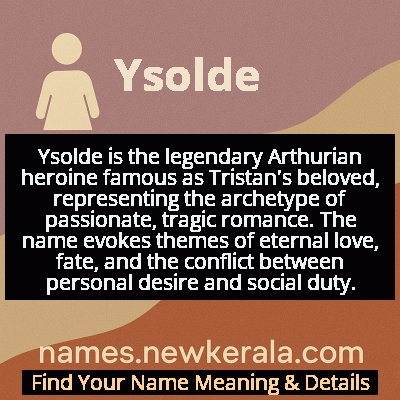Ysolde Name Meaning & Details
Origin, Popularity, Numerology Analysis & Name Meaning of Ysolde
Discover the origin, meaning, and cultural significance of the name YSOLDE. Delve into its historical roots and explore the lasting impact it has had on communities and traditions.
Name
Ysolde
Gender
Female
Origin
Arthurian
Lucky Number
8
Meaning of the Name - Ysolde
Ysolde is the legendary Arthurian heroine famous as Tristan's beloved, representing the archetype of passionate, tragic romance. The name evokes themes of eternal love, fate, and the conflict between personal desire and social duty.
Ysolde - Complete Numerology Analysis
Your Numerology Number
Based on Pythagorean Numerology System
Ruling Planet
Saturn
Positive Nature
Ambitious, efficient, realistic, and authoritative.
Negative Traits
Materialistic, stressed, confrontational, and can be overly ambitious.
Lucky Colours
Dark blue, black.
Lucky Days
Saturday.
Lucky Stones
Blue sapphire, amethyst.
Harmony Numbers
2, 4, 6.
Best Suited Professions
Business leaders, managers, financial services, law enforcement.
What People Like About You
Leadership, determination, organizational skills.
Famous People Named Ysolde
Ysolde (Legendary)
Arthurian Character
Central figure in the Tristan and Iseult legend, symbol of tragic romance
Ysolde Denis
French Actress
Notable French stage and film actress known for dramatic roles
Ysolde Menges
British Violinist
Renowned violinist and child prodigy who performed internationally
Name Variations & International Equivalents
Click on blue names to explore their detailed meanings. Gray names with will be available soon.
Cultural & Historical Significance
The character has evolved through various cultural interpretations, from the Celtic oral traditions where she may have been a powerful sorceress, to the courtly romance versions where she embodies idealized love, to Wagner's operatic interpretation where she becomes a symbol of transcendent love and death. Her story has been adapted in countless forms including poetry, opera, film, and literature, making her one of the most recognizable figures from Arthurian legend outside of the immediate Arthur-Guinevere-Lancelot triangle. The enduring appeal of her story speaks to universal themes of forbidden love, fate, and the conflict between personal desire and social obligation.
Extended Personality Analysis
Ysolde is typically characterized by intense passion, emotional depth, and tragic romanticism. As depicted in the legends, she possesses a fierce loyalty to her true love Tristan, combined with a willingness to defy social conventions and political alliances for the sake of that love. Her personality embodies the conflict between duty and desire, often showing remarkable courage in the face of societal expectations and potential consequences.
Beyond the romantic aspects, Ysolde is frequently portrayed as intelligent, resourceful, and possessing medical knowledge (as the 'healer' of Tristan's wounds in some versions). She demonstrates strategic thinking in navigating the dangerous political waters of medieval courts while maintaining her secret relationship. Her character shows both vulnerability and strength—capable of deep emotional suffering yet resilient enough to endure the tragic circumstances of her love story. The complexity of her character makes her one of the more psychologically nuanced figures in Arthurian literature, representing a woman who actively shapes her destiny rather than passively accepting her fate.
Modern Usage & Popularity
In contemporary times, Ysolde remains a rare but distinctive choice for baby names, primarily among parents with an interest in Arthurian legend, Celtic heritage, or literary names. The name has never reached mainstream popularity, which contributes to its unique and sophisticated appeal. It's most commonly used in its 'Isolde' spelling variation, particularly in German-speaking countries and among classical music enthusiasts familiar with Wagner's opera. The name has seen occasional use in artistic and academic families who appreciate its literary and historical significance. While not appearing on most popular baby name lists, it maintains a steady, niche presence that ensures it remains recognizable without becoming commonplace. Recent years have seen a slight increase in usage as vintage and mythological names gain popularity.
Symbolic & Spiritual Meanings
Ysolde symbolizes the eternal conflict between passion and duty, representing the idea of love as both transcendent and destructive. She embodies the concept of fate-bound romance—the notion that some loves are so powerful they transcend social boundaries and rational considerations, yet carry inevitable tragic consequences. The love potion in her story serves as a metaphor for the uncontrollable, intoxicating nature of true passion that cannot be denied or reasoned away. Beyond romantic symbolism, Ysolde represents feminine agency within constrained circumstances—a woman navigating patriarchal power structures while pursuing her own desires. She also symbolizes healing and transformation, both literally as Tristan's healer and metaphorically as someone whose love transforms both herself and her lover.

